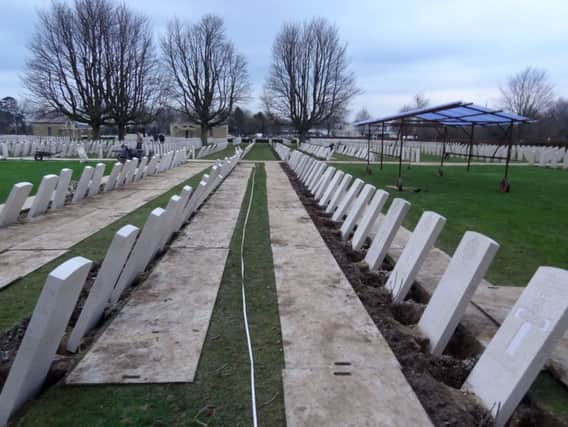4,000 new headstones for fallen of D-Day


The last of more than 4,000 headstones have been re-laid at the Bayeux War Cemetery in Normandy, marking the culmination of months of work ahead of the historic commemorations in June.
The Commonwealth War Graves Commission (CWGC) is working to replace thousands of fallen and damaged headstones at its cemeteries across France and beyond, as it marks both the 70th anniversary of the Normandy landings and the centenary of the First World War.
Advertisement
Hide AdAdvertisement
Hide AdJust over 4,000 headstones have been replaced at Bayeux, with more replaced at other sites including nearby Ranville, the first village to be liberated after the landings.
More than 8,000 of the now-famous white stones have been replaced, after years of ageing and weather damage left some of the inscriptions impossible to read. Work at Bayeux started in October and finished in February, with the final headstone laid last week.
William Moody, Normandy sector supervisor for the CWGC, which looks after cemeteries and memorials at 23,000 sites in 153 countries worldwide, said: “We have changed 8,000 headstones, 4,000 in Bayeux. To us, it’s an achievement to make sure that the cemetery will be ready for the commemoration of the 70th anniversary. We owe it to the veterans.”
Describing the magnitude of the task, he said the removal of the headstones had left it looking like a “battlefield”, saying: “It was a very big task, we had to remove the headstones, all the plants, cut the roses down. It was phenomenal really.”
A special service will be held at Bayeux on 6 June – the anniversary of D-Day – with a huge turnout expected.
Mr Moody said: “It will be particularly emotional this year because for many of the veterans it’s the last one, they are 92, 94, 96. It’s thanks to them that we are free, them and the people buried here.”
The final headstone at Bayeux was carefully laid by Gardener Caretaker First Class Myles Hunt, who followed in his father’s footsteps by working for the commission.
The 54-year-old, originally from Bishop Auckland, County Durham, said: “It’s a very significant day for me, I felt really proud to be able to do that.
Advertisement
Hide AdAdvertisement
Hide Ad“My father used to work here in the past and ten years ago I received a commendation for my work at Ranville Cemetery, so ten years later to be able to lay the last headstone here in Bayeux is a privilege. It’s very important we remember those that have given their lives, not only cases like this that we see in the cemeteries, but for people to give their lives and just be forgotten, it seems really awful.
“Even when I’m weeding the borders now and again, I just put my head up and see a name and although it doesn’t mean that much to me, I just try and flash back and think of the devastation it caused to the families, to their close ones – this is going to be their 70th anniversary.”
On 6 June, the largest amphibious landing the world had ever seen – crucial to the allied victory in Europe in 1945 – will be commemorated on both sides of the English Channel.